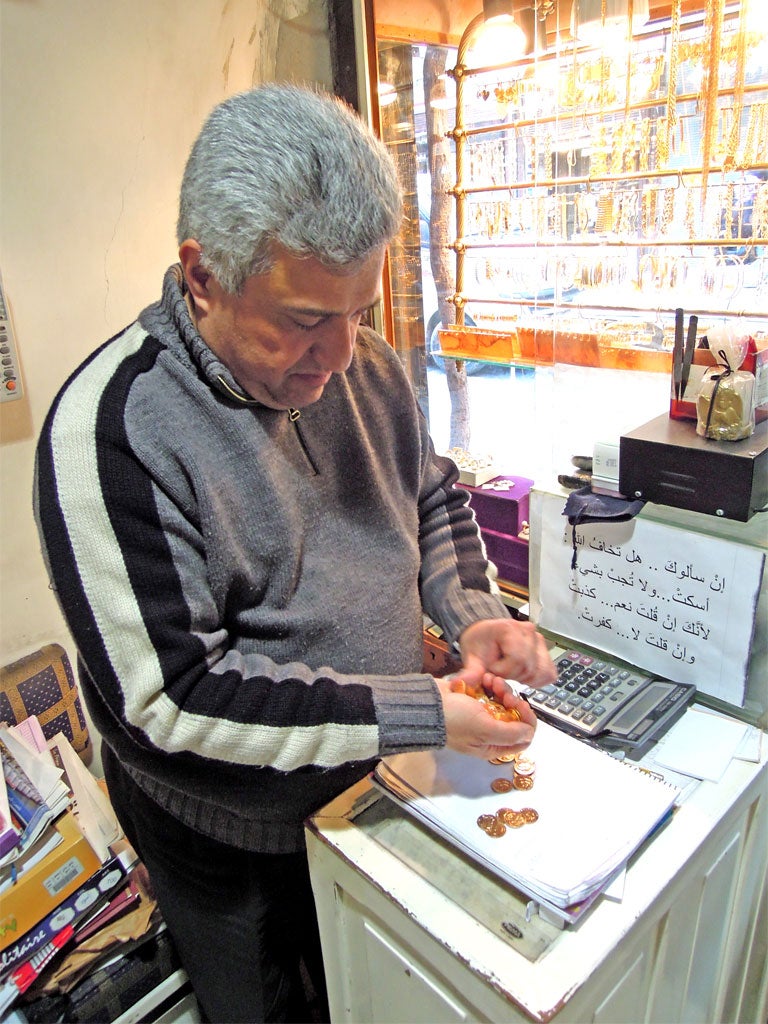Inside Damascus: The poor get by, the rich find a way to make money

There are cities where people are used to power cuts, and bear them with a grumble before lighting fires or turning on generators. Damascus is not one of them.
When the city is plunged into darkness at around 8pm every night, residents stumble over kerbs in blacked-out streets and go through their pockets for the forgotten torches they have not yet learnt to carry with them at all times.
People in the city centre insist that everything is fine and the "situation" of the past 11 months has little effect on them. But reality encroaches for a few hours every morning and evening. Since late last year, the city is suffering the first blackouts for as long as many can remember, as a government unable to sell much of its oil because of sanctions tries to cut corners.
"Since early December, people in Damascus have started having daily power cuts and a shortage of cooking gas and of heating oil," says Jihad Yazigi, editor of the business website, The Syria Report. "You really start to feel – much more physically – the impact of the overall crisis."
Many people have fled neighbourhoods where the army and the opposition clash, putting a burden on family and friends in city centres. The price of basic food staples has risen by 25 per cent as the Syrian currency plunges and the knock-on effects of blackouts are keenly felt.
"There is a problem with the water. Since there is no electric pump there is no water... [My family has] very, very heavy depression," says one man who recently relocated his wife and children from a conflict-hit suburb to central Damascus.
For the poor, their priority is to to survive day-to-day, feed their children and not to get caught in the crossfire. The rich and powerful, for the time being at least, remain rich and powerful. And for those in the middle, it is all about how to make do and protect their interests and savings until one side emerges victorious from the bitter and bloody struggle for power.
Nicolas Karout, a gold seller in the old city, says his patrons have stopped spending their money on frivolous things such as bangles or a pair of earrings. Instead, he is seeing a roaring trade in gold sovereigns.
"In the past 10 months I have sold more gold coins than my father and grandfather sold in their whole lives," he says with a laugh.
"Syrians are not idiots, they know their interests and they know when there are security and economic problems they know the value of the money will decrease and they go to gold, which has always been a refuge."
This gold is ferreted away under a pillow or in a safe, far away from banks that may be the target of further sanctions. The Syrian pound stood at about 47 to the US dollar in March last year when the first protests against President Assad began. Now, on the black market, the exchange rate is about 70 Syrian pounds to the dollar.
Mr Karout is one of the lucky ones. For many in the winding alleys of the old city, the shutdown of the tourism industry has robbed them of their livelihood. Outside Damascus it is worse and few will venture to their summer homes in the nearby mountains towns, where restaurants and hotels sit empty.
The United States and the European Union hope that by turning off the foreign currency tap the regime will crumble as the influential business community turns against them.
Current sanctions imposed in two rounds late last year forbid the purchase of Syrian oil and doing business with certain state companies and could get even harsher this month, targeting commercial flights between Syria and Europe, financial transactions with the central bank, and the trade of gold, diamonds and phosphates.
It is the ban on oil exports, however, that could really cripple the regime. In 2010, oil accounted for 50 per cent of Syrian exports, and 90 per cent of that oil went to the EU. Syria has tried to find alternative markets but has not been able to make up the shorfall.
With hundreds of thousands of barrels of crude oil sitting unsold, the government can no longer afford the fuel it normally imports for domestic consumption, hence the power cuts.
But as is often the case with sanctions, while ordinary people feel the squeeze, the top brass and leading businessmen find a way around the restrictions.
An art dealer told The Independent that his business among Syrians had fallen by 90 per cent, but asked if his clients in the Middle East were unable to pay for their commissions, he simply shrugged and said he had a cousin in Lebanon who could handle the transactions for him.
For the moment, the business community – in Damascus at least – is waiting it out, laying off staff and cutting costs while keeping a close eye on which side looks like winning.
Subscribe to Independent Premium to bookmark this article
Want to bookmark your favourite articles and stories to read or reference later? Start your Independent Premium subscription today.

Join our commenting forum
Join thought-provoking conversations, follow other Independent readers and see their replies